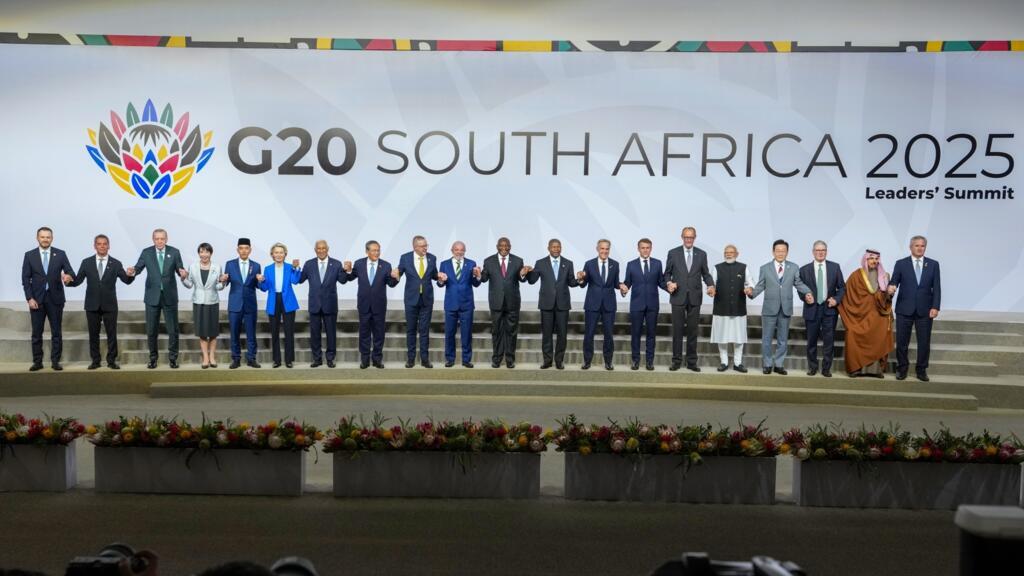
The G20 summit in Johannesburg closed on Sunday with South Africa claiming a diplomatic victory after securing agreement on a wide-ranging declaration – despite a boycott by the United States and warnings from several leaders that the forum is struggling to remain relevant in a fragmenting world.
South Africa's President Cyril Ramaphosa said on Sunday that the Leaders' Declaration from this weekend's Group of 20 summit reflected a "renewed commitment to multilateral cooperation".
As host of the Johannesburg summit, Ramaphosa pushed through the declaration addressing global challenges like the climate crisis, despite opposition from the US.
Addressing the summit's closing ceremony on Sunday, Ramaphosa said the declaration showed that world leaders' "shared goals outweight our differences".
The Trump administration boycotted the event because of allegations – widely debunked – that South Africa's black majority government persecutes its white minority. It also said South Africa's priorities – inculding cooperation on trade and climate – ran counter to its policies.
In an unprecedented move, Pretoria released the 122-point declaration at the start of the two-day meeting on Saturday – a decision that broke with G20 protocol and annoyed Washington.
Diplomatic tensions overshadowed the final hours of the summit as South Africa refused to stage the traditional handover of the rotating presidency, scheduled to pass to the United States for 2026. President Donald Trump plans to hold the summit at a Florida golf club he owns.
South Africa 'will not be bullied,' Ramaphosa says after Trump attack
What was agreed?
The declaration called for more global attention on issues that specifically affect poor countries, such as the need for financial help to recover from climate-related disasters, debt relief and support for the transition to greener energy sources.
Leaders representing 19 countries, the EU and the African Union called for climate-related funding to increase “from billions to trillions globally”, echoing commitments made as Cop30 concluded in Brazil.
The text also emphasises the “imperative” of tackling global disparities in wealth and access to development, though it stops short of endorsing the international panel on inequality championed by South Africa.
On energy transition and resources, the declaration urged efforts to secure supply chains for critical minerals amid intensifying geopolitical tensions.
Regarding security, it said the organisation will work for a comprehensive and lasting peace in Sudan, the Democratic Republic of Congo, the occupied Palestinian territory and Ukraine.
The summit marked an important moment for African nations, more than 20 of which attended as guests.
Germany announced new investments through the pan-African insurer ATIDI, while the Compact with Africa programme – launched at the G20 in 2017 – received fresh commitments. The United Arab Emirates pledged US$1 billion to expand artificial intelligence infrastructure across Africa.
"South Africa has used this presidency to place the priorities of Africa and the Global South firmly at the heart of the G20 agenda," Ramaphosa said.
G20 outcomes are not binding so it's not clear whether the declaration will translate into concrete action.
Several of South Africa’s ambitions – including stronger language on taxing billionaires – were watered-down.
Africa takes centre stage as South Africa maps ambitious G20 agenda
Geopolitical crises
The summit came at a time of heightened tensions between world powers over Russia's war in Ukraine, and fraught climate negotiations at Cop30 in Brazil.
The declaration made just one reference to Ukraine, calling for a “just, comprehensive and lasting peace” based on the UN Charter, despite gathering the vast majority of the world's leaders.
"Meeting for the first time on the African continent marks an important milestone," said French President Emmanuel Macron, but added the G20 bloc was "struggling to have a common standard on geopolitical crises” and "may be coming to the end of a cycle".
British Prime Minister Keir Starmer agreed, saying: “There’s no doubt, the road ahead is tough.”
Ramaphosa, Macron step up talks on Ukraine as South Africa joins push for peace
China’s premier, Li Qiang – filling in for President Xi Jinping – said “unilateralism and protectionism are rampant”, and warned of mounting pressure on global solidarity.
Still, some praised the summit as a significant symbolic moment for the G20, which is actually a group of 21 members formed in 1999 as a bridge between rich and poor nations to confront global financial crises.
“This is the first ever meeting of world leaders in history where the inequality emergency was put at the centre of the agenda,” said Max Lawson of Oxfam – the international charity working to alleviate global poverty.
(with newswires)







